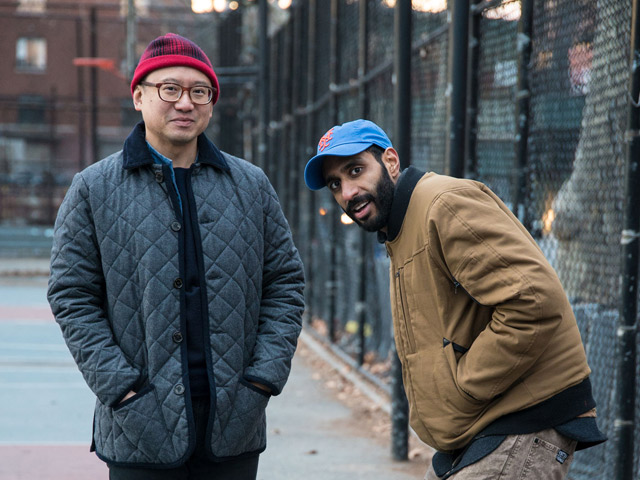Ashok Kondabolu of Das Racist interviews Anil Dash, the blogger and technologist, at Financier Patisserie, near Astor Place.

September 11, 2012
Just screaming it.
Yeah, so he was in the voiceover booth just shouting, “Here’s a new song by Next!” And I would be like, alright, that was cool. It felt like I was a king. I think I was making 27,000 dollars a year, living in Manhattan, and I was happy as shit.
We did promos on records, doing videos and voiceovers of like—I remember in the first year it was half has-been hair-metal groups. I mean, there would be Whitesnake and stuff. I didn’t know shit about it. The other half was like Dead Prez and Wu-Tang. I remember doing a phone call with Faith Hill when she was big hot shit, and I was like, this is it. You know? And I was doing it for a while, and the guy who founded it, in 1999, he was like, we’re going to be a dot com. I was like, uh-oh. Because I knew tech. I didn’t know that I knew tech, because I was young. I was like, this doesn’t seem like a tech start-up, let’s stick to our shit. And he was like, no, no. And they started a dot com site, and they were going to host videos.
I think if things had been perfect and everybody knew what they were doing, it would have been like a YouTube or VEVO kind of thing, but that wasn’t going to happen in 2000, because we had dial-up modems and there was no video. It just wasn’t going to happen.
Towards the end of when I was there, we went to a big meeting—like, BMG Records. It was a big office overlooking Times Square—I had never been to the top of it. We meet with some big macho guy, and (it was the summer that Napster came out) toward the end of this meeting, I was like, “What are you guys doing about Napster?” He just looks at me and says, “What’s Napster?” And I thought, “Awwwww, fuck.” If he doesn’t know something fundamental, am I crazy, or was he? Was my view of the whole world wrong, or was his? He’s a millionaire. Then of course, the dot com bubble went away and the company kind of fell apart and I got laid off—all that shit that happened to everybody in 2001. I think I dodged a bullet, because what if it had worked?
(Laughs) That would have been the worst sucky years of your life.
It would have been hell. So yeah.
You would turn into that guy.
Yeah, totally! That was actually the other thing. For two or three years after, I barely listened to music. I was so put off on the industry. I remember sitting down with Three 6 Mafia; we were doing promo on their first record. I remember I had a kind of nice pen, like a twenty-dollar pen instead of a BIC pen, and after sitting down with them, that shit was gone. They just took it. Again, making no money being in Manhattan, I was like—“I really liked that pen.” That stuck with me, because they didn’t need it, you know, they were signed, they were fine.
You would probably have given them the pen.
Oh, totalllly, I would have totally given it to them, because I was like, these guys are good. You know? It was “Sippin’ on some Sizzurp.” I’m like, this is fucking great; I’ve never heard anything like this. But all the artists were good people. I remember GZA came up one time, and this kid was with him, and he was helping this kid with his math homework.
Was he able to do the homework with him well?
He’s a genius, how could he not? (Laughs)
It would be disappointing, if he couldn’t, just wondering. (Laughs)
That would be heartbreaking wouldn’t it? I think it was algebra; I don’t think it was that hard. But you realize—all of the execs are completely clueless or really awful. Treated people poorly, treated the interns like shit. The industry is probably a little better now, but it just put me off from the whole thing. I was like, let it all burn.
Was it after that that you had your first job in tech?
Well, I was at the Village Voice for a little while, doing development—I was making stuff for the website, programming. I was a paid programmer, but I had started blogging before that. I’d been blogging about the music world, I just felt like there was something there. In retrospect, it felt to me very much like the first time my friends had gotten their DJ rigs growing up: I’m creating in my bedroom something the whole world can just vibe onto. It felt exactly like that, because we were also working on inventing the format. You go on a Tumblr and it has permalink (the link to the post); a friend of mine invented that. Someone had to invent putting comments under a blog post. We don’t yet have the history of who was the Afrika Bambaataa of blogging. If there was a Sugar Hill Gang, if there was a “Planet Rock” of blogs, that was the stuff that I was around, and got to see. You were aware of it, you were like, this is going to win. This is going to take over the world.
Right, the idea seemed so obvious.
This is the future, and we see it—it’s just early. So, I was at the Village Voice, and I was working on, like, apartment listings. And then one month, there weren’t any. (Laughs) I was like, ohhhhh shit. A couple of months later, again, same thing—got laid off, industry changed. I mean, shame on me, music and newspapers. If you know anything about technology, in the early 2000s, what are the two industries you would never, ever go into?
It’s those two.
That’s what it took for me to really believe—losing two jobs in two to three years is what it took [to say] no, I’m not the one who is crazy, the guys in the suits are crazy, I’m going to go all in on this. My friends had just started making one of the first blogging tools, and I was like, I’m going to go join them. I was literally doing Excel spreadsheets for them and trying to plan business, for free. Because I think, this is going to take off. Then they started the company, they started to get people to use their product, and I was like, alright let me help you. And that was it.
I didn’t even know what venture capital was. I didn’t know how investing works. I didn’t know the contract that you sign, like the equivalent of getting your band signed—the term sheet. We were just learning it. I’d never written a press release, and we had to write a press release. You fast-forward two years later, and my friends who were the founders, they were on the cover of Fortune Magazine. Like the Instagram guys—they were those kids. It was really interesting to watch ’cause I was in it, working on it, and also not of it. I hadn’t been the founder so I was kind of behind the scenes. I think I saw the best and the worst of it immediately.




